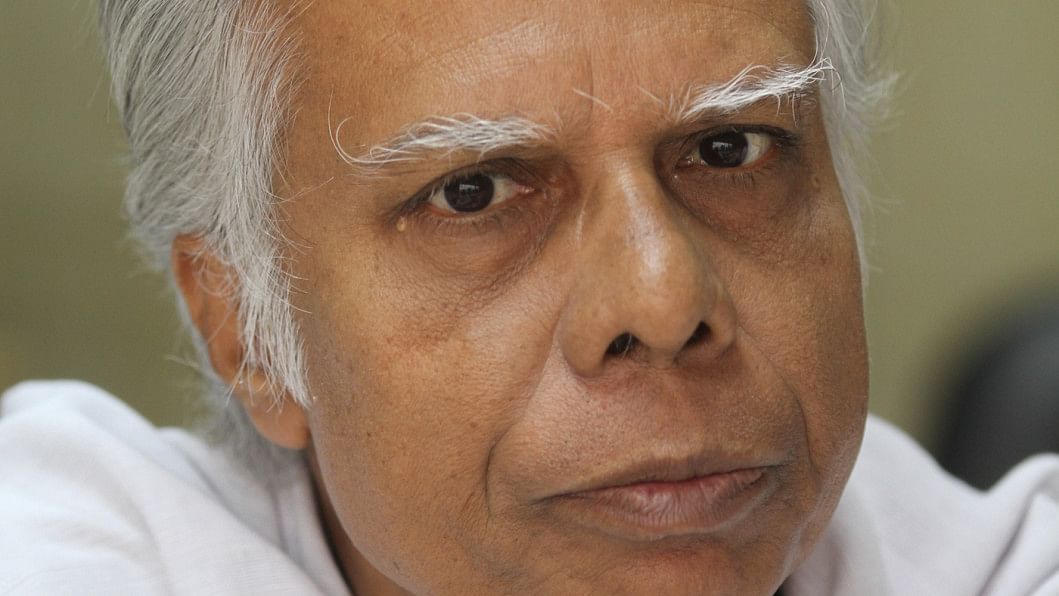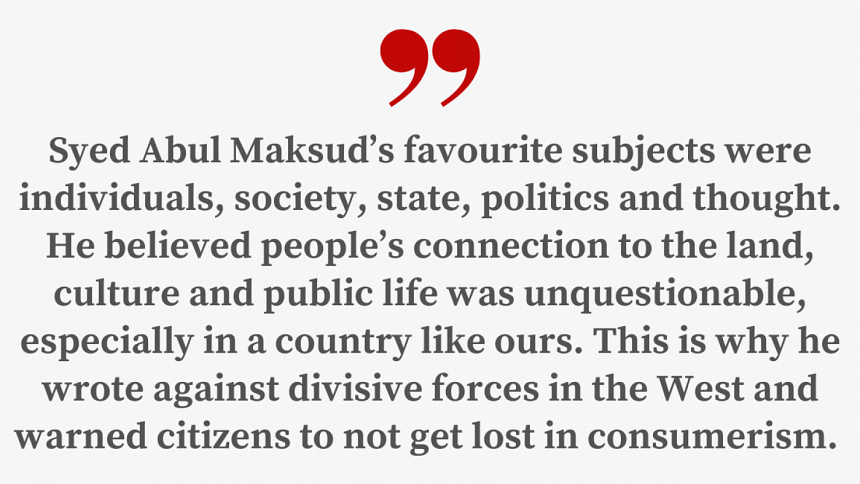Syed Abul Maksud: A man of great integrity

My first personal interaction with Syed Abul Maksud was at the office of Sangbad in the 80s. He seemed rather solemn, but very soon I found hiding underneath that mantle of gravity a cheerful, humorous and accomplished human being. He was a principled man, with no discrepancies between his actions and beliefs – something that cost him, but never unsettled him.
Of course, it wasn't possible for me to find out so much in the half hour that we spent there. All this I understood in the almost four decades during which I knew him. But from that day in Sangbad, I started to address him as Maksud Bhai, and I quickly found him to be a man of talent, refined tastes and rationality, who accepted the joys of life alongside its troubles, and was always ready to help others.
The more I read his writings, the more I learnt of his scholarliness, grasp of history, political ideology and sense of justice. He was a hard-working researcher and intellectual, who never gave in to despair even during the country's worst crises. His belief in the capacity of the masses, his faith in socialist politics, and his hope in time's ability to take impossible turns aided this. His latent sense of humour and measured but sharp use of sarcasm greatly added to his considered opinions, and it was clear he thought of words as a weapon of change.
He believed that no matter how heavy the darkness, it will end with the younger generations. In a 2004 interview in the weekly Ekota, he said, "The youth will be successful where we have failed." I don't believe this was said as consolation; rather, there was conviction behind these words. He also said, "We have our own language. We have our own philosophy, thoughts and consciousness. An incredible harmony between Hindu, Buddhist and Muslim cultures exists here… But we cannot just stand in one place. We must move forward."
This notion of progress was extremely important to him. He held a deep conviction in shifting the status quo and not just being with the times, but a few steps ahead of it. He respected Maulana Bhashani and his politics, and although I never heard him support any party (he rarely spoke of himself), his writings make clear he leaned towards Left politics. He disliked those who had destroyed the unity of the Left but was hopeful of its resurgence, and once said that there was no other alternative in taking Bangladesh forward.
Syed Abul Maksud spent his student years in his village, Elachipur, in Manikganj, and then in Dhaka University. Although he was involved with Chatra Union, which was his introduction to the Left, as a professional journalist he stepped away from participating in politics. In 1971, he took part in the Liberation War and also became a correspondent at The Jai Bangla. However, I never heard him introduce himself as a freedom fighter. To him, it was natural for a young person in 1971 to have joined the war, in the same way that it was natural for politics to be pro-people and progressive, based on justice and equality.
Integrity was another subject that held his attention. Even though such integrity is increasingly becoming rare, Syed Abul Maksud was not despondent, and identified this inadequacy as a direct result of capitalism and corporate culture. He believed that if we could stand up to capitalism, or at least resist its influence with education and culture, then it would be possible to recover – but this had to happen in institutions, within individuals and, at some point, in politics.
Two instances of his own integrity were witnessed by us all. After the militant attack on Professor Humayun Azad, Syed Abul Maksud wrote about BNP-Jamaat's patronage of extremism in his Prothom Alo column (no government liked his ability to look power in the eye and tell the truth, which is why he never received any state awards). At the time, he was working at the Bangladesh Sangbad Sangstha, where he was ordered to submit an apology. He refused and resigned, creating an example that was admired but not followed.
The second example is his satagrahya against the 2003 US-led invasion of Iraq by Western forces. As a part of this, he boycotted Western clothing and started wearing an unstitched white cloth. Although he faced ridicule at first, he did not change his position.

I never found out which of his fields of work Syed Abul Maksud liked to be known for. But he found happiness and satisfaction through writing. He wrote poetry, travelogues, literary critiques, and on the life and works of writers and philosophers; he wrote on the history of newspapers and periodicals, on Shadhin Bangla Betar Kendra, and on the politics of Rabindranath; he wrote numerous books on Syed Waliullah, Maulana Bhashani and Mahatma Gandhi, and he wrote on Dhaka University (DU).
Quite a few of these are research books where he maintained high standards, and included archival work, field research, interviews and published (or completed but unpublished) books, etc. However, the success of all research depends on fundamentally creating or uncovering something. For example, you can find quite a few books on DU in the market, but Syed Abul Maksud's Dhaka Bishshobiddyaloy o Bangladesher Ucchoshikkha – which received Prothom Alo's best book of 1422 award – is unique.
In it, alongside the history of establishing DU, he wrote of the deprivation of Muslims in East Bengal during the British colonial period, the reasons behind their anger and dissatisfaction, and how DU helped middle-class Muslim society and played a role in women's education. The book didn't just focus on DU; the political history of this region, Hindu-Muslim relations, conflict and communal harmony, the evolution of Dhaka city and its transformation into a centre of education, the turbulent times before Partition and a number of important events from that time were also reflected in it.
Syed Abul Maksud's favourite subjects were individuals, society, state, politics and thought. He believed people's connection to the land, culture and public life was unquestionable, especially in a country like ours. This is why he wrote against divisive forces in the West and warned citizens to not get lost in consumerism. He stressed on the relationship between individuals and society and kept his faith in the masses, but he also prioritised individual freedom. He believed in free thought that is creative, farsighted and rational, and lamented over our educational system's and institutions' inability to establish this.
Syed Abul Maksud was himself an activist, and he inspired others to follow the path of activism. We lost him at a time when our society needs someone like him the most. His loss will be felt most in the world of thought. We are lucky that at least his writings will, to some extent, fill the emptiness he has left behind him.
Translated by Shuprova Tasneem.
Syed Manzoorul Islam is a retired professor of Dhaka University, and currently a professor of English and Humanities at ULAB.

 For all latest news, follow The Daily Star's Google News channel.
For all latest news, follow The Daily Star's Google News channel. 







Comments